Fragile X syndrome research accelerates as the Turner Lab secures $1M to expand FRAXA-funded work on curative therapy targeting the missing FMRP protein.
Read moreEEG
Altered Physiology of Primary Visual Cortex in Fragile X Syndrome
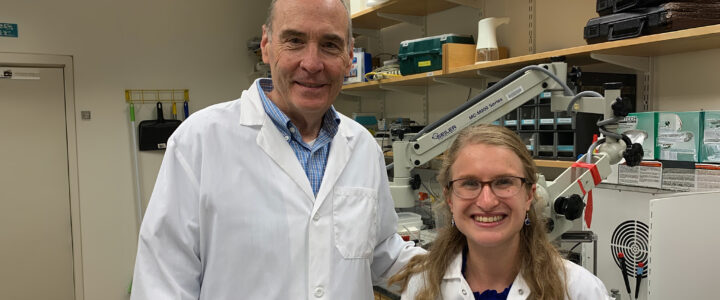
Discover how a $100,000 FRAXA grant supports research at MIT targeting neuron dysfunction in Fragile X, aiming to develop new therapies to improve sensory processing and behavior.
Read moreFragile X Unplugged: Establishing Mobile EEG as the Next Frontier

Discover how a $100,000 FRAXA grant awarded to Cincinnati Children’s Hospital is advancing Fragile X research by simplifying EEG technology for home use, improving clinical trial accessibility and efficiency.
Read moreBK Channel Openers: A New Drug for Fragile X Is Ready for Clinical Trials
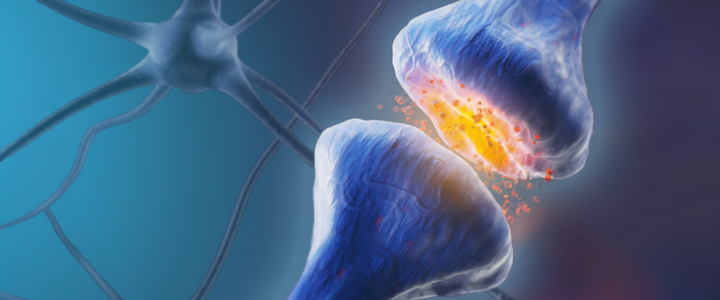
Discover the promising new BK channel opener, SPG601, now entering clinical trials for Fragile X syndrome. Learn about its potential to restore synaptic function and address core symptoms.
Read moreRecruiting: Unveiling Probiotic Potential in Fragile X Syndrome Clinical Trial

First of its kind in Serbia, this clinical trial explores probiotic intervention as a potential treatment avenue for Fragile X syndrome.
Read morePharmacological Modulation of Nicotinic Signaling
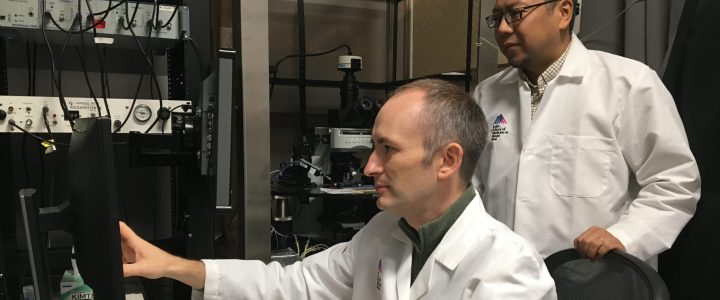
Nicotine — familiar to any smoker — tickles nicotinic acetylcholine receptors in the brain. These receptors are key to important brain functions including learning and memory. This team will explore whether drugs that dampen these receptors can improve cognitive function in Fragile X.
Read moreSomatosensory Processing as a Therapeutic Target for Fragile X Syndrome
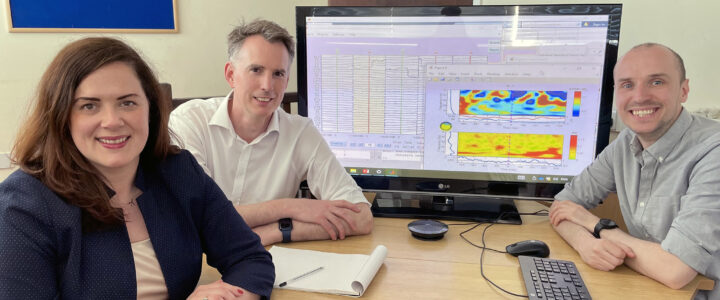
Awarded a FRAXA Research grant, Dr. Andrew Stanfield, Dr. Leena E. Williams, and Dr. Damien Wright are set to explore somatosensory processing (sense of touch) in Fragile X syndrome at the University of Edinburgh. Their aim? A noninvasive touch test that could set the stage for future clinical trials in FXS.
Read moreA Tat-Conjugate Approach to Treat Fragile X Syndrome

Explore Turner Lab’s novel approach to developing definitive treatment for Fragile X syndrome with a Tat-conjugated, truncated FMRP protein. This innovative strategy aims to restore brain circuit function and reduce abnormal behaviors linked to Fragile X by directly addressing the cause of Fragile X: a missing protein.
Read moreValidating Novel Inhibitors of ERK Signalling to Treat Fragile X Syndrome

One promising treatment approach for Fragile X syndrome is to inhibit on a neuronal pathway, ERK. ERK inhibitors are also being studied as treatments for other disorders including autism.
This team has conducted pilot studies showing that ERK inhibitors are very effective in reversing signs of disease in Fragile X mice. With this grant from FRAXA they will take the next steps toward possible clinical trials of an ERK inhibitor for individuals who have Fragile X syndrome.
Targeting Serotonin 1a Receptors to Reverse Neurobehavioral Phenotypes
Neurolixis’ new drug targets serotonin 1A receptors, showing promise in preclinical studies for Fragile X syndrome, funded by a FRAXA grant for future clinical trials.
Read moreRecruiting: BRIDGE Study (BRain Indicators of Developmental Growth)
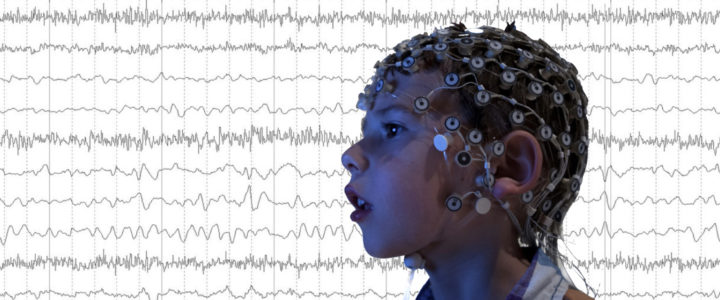
This study from the Wilkinson Lab at Boston Children’s Hospital is investigating how differences in brain activity affect learning, language and behavior in children with Fragile X syndrome, Down syndrome, and Autism Spectrum Disorder. One of the goals is to find brain markers that predict cognitive, language, and behavioral difficulties in these groups. Another goal is to better understand the differences in brain activity between young children with and without Fragile X and Down Syndrome, and whether these differences are similar in children with Autism Spectrum Disorder.
Read moreRecruiting: Clinical Study of Non-Invasive EEG for Children Ages 2-7
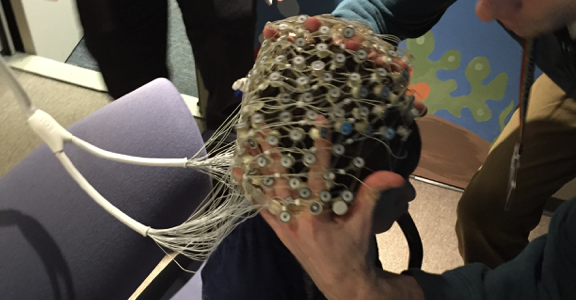
Dr. Carol Wilkinson, MD PhD, and Dr. Charles Nelson, PhD, at Boston Children’s Hospital are recruiting children ages 2-7 years with Fragile X syndrome to participate in a study of brain differences using non-invasive EEG.
Read moreCannabinoids as a Treatment for Fragile X Syndrome

Many people with Fragile X syndrome are hyper-sensitive to sights and sounds, and Electroencephalography (EEG) studies show that there are abnormalities in brain circuits. EEG studies show similar changes in Fragile X mice. So the team will use EEG tests in mice to find which drugs best reduce hypersensitivity. They can then easily move on to human EEG-based clinical trials. What they learn will tell us much more about why people with Fragile X are hypersensitive – and which drugs could best help them.
Read more2021 Fragile X Research Grants Funded by FRAXA Research Foundation

Each year, FRAXA funds a diverse portfolio of research. Our FRAXA Fellowships are seed funding for the future, the feedstock for the Fragile X treatment development pathway. While we are looking to promote as many promising new approaches as possible, prominent themes emerge each year, as scientists around the world tackle previously neglected areas.
Read moreIdentifying Cellular and Molecular Signatures in Human Neurons That Distinguish Fragile X Syndrome Patients with Divergent EEG Profiles

Why is it so hard to find the right medications to help people with Fragile X syndrome? Just as Fragile X affects individuals differently, medications do as well. This project aims to bring personalized medicine to Fragile X syndrome.
Read moreFRAXA Drug Validation Initiative (FRAXA-DVI)

The FRAXA Drug Validation Initiative (FRAXA-DVI) provides speedy, cost-effective, objective preclinical testing of potential Fragile X treatments. FRAXA-DVI uses in-vitro systems, behavior batteries, and gene expression and peripheral biomarker platforms to validate investigational new drugs and repurposed available compounds in Fragile X syndrome (FXS).
Read moreIntegrating Human and Mouse Studies in Fragile X Syndrome – an NIH Center Approach

Presentations by:
Craig Erickson – Translational medicine and mechanistic studies of brain neurophysiology in Fragile X Syndrome: A NIH Center Overview
Ernest Pedapati – Network Mechanisms, Biomarkers, and Pharmacology of Fragile X Syndrome in Humans
Devin Binder – Network Mechanisms of Neurophysiology and Behavior in mouse models of Fragile X Syndrome
Kimberly Huber – FMRP Regulation of local and long-range neocortical circuits in the mouse: Links with EEG phenotypes
Interrogate the Functions of FMRP in Brain Development Using Stem Cells

Dr. Xinyu Zhao of the Waisman Center and Department of Neuroscience at University of Wisconsin-Madison joins us in this seminar to present Interrogate the Functions of FMRP in Brain Development Using Stem Cells.
Read moreOvercoming the Placebo Effect in Fragile X Clinical Trials

In a placebo-controlled clinical trial, some participants are given an experimental medication, while others are given a placebo. Participants do not know whether they are taking medicine or placebo. In theory, this can allow researchers to rule out the placebo effect by comparing outcomes among the two groups. But, per Wexler (2020) “having a strong placebo effect can obscure any real effect of the therapy being investigated”.
Read moreUse of EEG as a Biomarker for Diagnosis and Outcomes in Neurodevelopmental Disorders
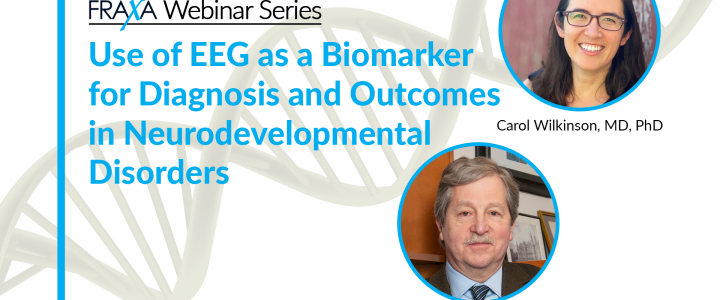
A series webinars focused on current topics in Fragile X research featuring Charles A. Nelson III, PhD, Professor at Harvard Medical School and Carol Wilkinson, MD, PhD, Instructor at Boston Children’s Hospital.
Read moreHealx Drug Repurposing Programme for Fragile X Syndrome
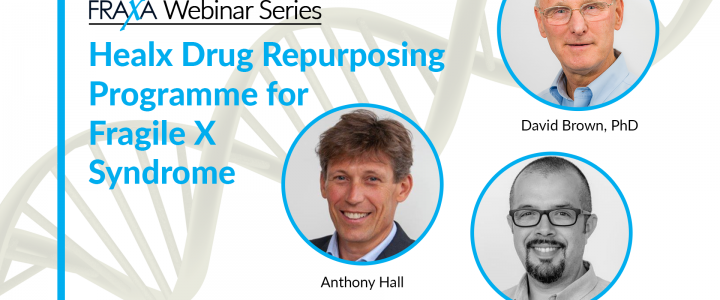
David Brown, MD, PhD, Ivan Angulo-Herrera, PhD and Anthony Hall of Healx present about the Drug Repurposing Programme for Fragile X syndrome.
Read moreAuditory System Dysfunction and Drug Tolerance in the Fragile X Mouse

FRAXA Research Foundation has awarded $90,000 over 2019-2021 to principal investigator Dr. Jay Gibson and postdoctoral fellow Dr. Andrew Holley at the University of Texas Southwestern Medical Center. They are investigating circuit mechanisms for auditory system dysfunction and drug tolerance in the Fragile X mouse model.
Read moreMechanisms and Biomarkers of Sensory Hypersensitivity in the fmr1 Knockout Mouse
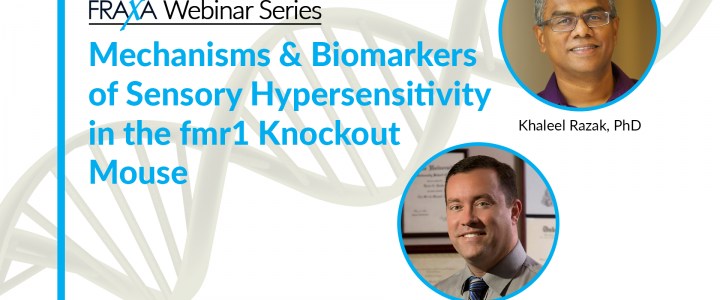
In this Fragile X research webinar we hear from Devin K. Binder, MD, PhD, Professor, University of California at Riverside Medical School and Khaleel Razak, PhD, Professor, University of California at Riverside as they present about Mechanisms and Biomarkers of Sensory Hypersensitivity in the fmr1 Knockout Mouse.
Read moreBrain Organoids and Therapeutic Development for Fragile X and Other Rare Diseases
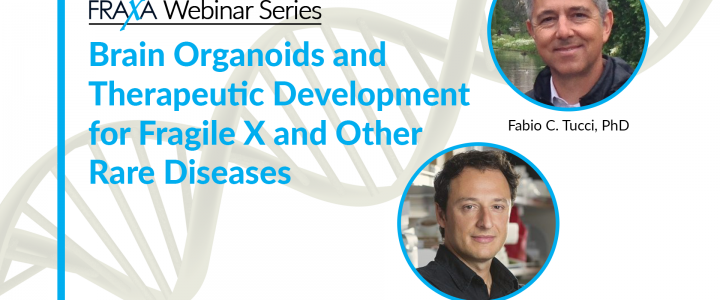
This is the first in a series of webinars focused on current topics in Fragile X research. In this webinar we hear from Alysson R. Muotri, PhD, Professor at University of California San Diego Stem Cell Programand Fabio C. Tucci, PhD, Chief Operating Officer and co-founder at Epigen Biosciences, Inc.
Read moreKetogenic Diet Eases Symptoms in Fragile X Male Mice
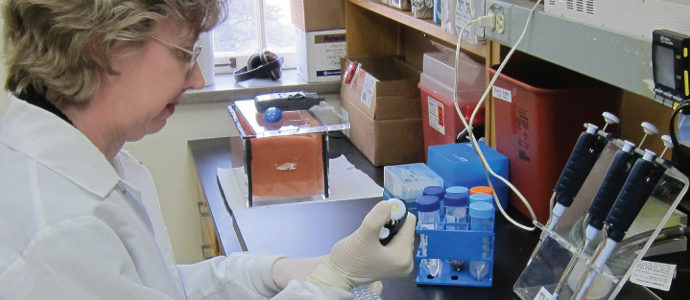
The Westmark laboratory continues to study sleep and rest-activity cycles in Fragile X mice as a potential outcome measure that correlates between preclinical and clinical research. The analysis of sleep EEG in the mice has proven more labor intensive than they anticipated, but the team is collaborating with Dr. Rama Maganti’s laboratory at UW-Madison on the development of computer scrips to speed up the analysis.
Read more